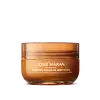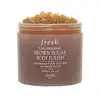What's inside
What's inside
 Key Ingredients
Key Ingredients

 Benefits
Benefits

 Concerns
Concerns

 Ingredients Side-by-side
Ingredients Side-by-side

Glycine Soja Oil
EmollientSucrose
HumectantButyrospermum Parkii Butter
Skin ConditioningCocos Nucifera Oil
MaskingHydrogenated Vegetable Oil
EmollientSilica
AbrasiveArgania Spinosa Kernel Oil
EmollientCitric Acid
BufferingAloe Barbadensis Leaf Extract
EmollientAnthemis Nobilis Flower Extract
MaskingSimmondsia Chinensis Seed Oil
EmollientLimnanthes Alba Seed Oil
Skin ConditioningPanax Ginseng Root Extract
EmollientCucumis Sativus Fruit Extract
EmollientBorago Officinalis Seed Oil
EmollientGlycerin
HumectantWater
Skin ConditioningCaprylyl/Capryl Glucoside
CleansingCaprylyl Glyceryl Ether
CleansingTocopherol
AntioxidantGlycolipids
Skin ConditioningSodium Cocoyl Glutamate
CleansingOlive Oil Polyglyceryl-6 Esters
EmollientAscorbyl Palmitate
AntioxidantGlycine Soja Oil, Sucrose, Butyrospermum Parkii Butter, Cocos Nucifera Oil, Hydrogenated Vegetable Oil, Silica, Argania Spinosa Kernel Oil, Citric Acid, Aloe Barbadensis Leaf Extract, Anthemis Nobilis Flower Extract, Simmondsia Chinensis Seed Oil, Limnanthes Alba Seed Oil, Panax Ginseng Root Extract, Cucumis Sativus Fruit Extract, Borago Officinalis Seed Oil, Glycerin, Water, Caprylyl/Capryl Glucoside, Caprylyl Glyceryl Ether, Tocopherol, Glycolipids, Sodium Cocoyl Glutamate, Olive Oil Polyglyceryl-6 Esters, Ascorbyl Palmitate
Sucrose
HumectantPrunus Amygdalus Dulcis Oil
Skin ConditioningPrunus Armeniaca Kernel Oil
MaskingSimmondsia Chinensis Seed Oil
EmollientOenothera Biennis Oil
EmollientCitrus Limon Peel Oil
MaskingPassiflora Incarnata Seed Oil
Skin ProtectingCitrus Grandis Peel Oil
MaskingHelianthus Annuus Seed Oil
EmollientLitsea Cubeba Fruit Oil
MaskingCitrus Aurantium Bergamia Fruit Oil
MaskingCitrus Aurantium Dulcis Oil
MaskingCymbopogon Schoenanthus Oil
MaskingPanax Ginseng Root Extract
EmollientTocopherol
AntioxidantLimonene
PerfumingCitral
PerfumingLinalool
PerfumingBHT
AntioxidantTriethyl Citrate
MaskingSucrose, Prunus Amygdalus Dulcis Oil, Prunus Armeniaca Kernel Oil, Simmondsia Chinensis Seed Oil, Oenothera Biennis Oil, Citrus Limon Peel Oil, Passiflora Incarnata Seed Oil, Citrus Grandis Peel Oil, Helianthus Annuus Seed Oil, Litsea Cubeba Fruit Oil, Citrus Aurantium Bergamia Fruit Oil, Citrus Aurantium Dulcis Oil, Cymbopogon Schoenanthus Oil, Panax Ginseng Root Extract, Tocopherol, Limonene, Citral, Linalool, BHT, Triethyl Citrate
Alternatives
Ingredients Explained
These ingredients are found in both products.
Ingredients higher up in an ingredient list are typically present in a larger amount.
Ginseng root is a well-loved ingredient in Asian skincare for good reason. It hydrates the skin, soothes irritation, and helps even out skin tone.
In traditional East Asian medicine, ginseng has been used for centuries both as food and as a healing remedy, and modern research continues to confirm its skin benefits.
One of the standout features of ginseng is its ability to improve blood circulation and oxygen delivery to the skin, bringing a fresh supply of nutrients to support overall skin health. It also has antioxidant and anti-inflammatory properties. This helps to protect your skin against damage from UV exposure, pollution, and daily stress.
Additionally, studies suggest that ginseng may help reduce hyperpigmentation by inhibiting tyrosinase, the enzyme involved in melanin production.
There are different types of ginseng used in skincare, and while they all share core benefits, their potency can vary.
Most products use fresh or white ginseng because it’s more affordable. However, red ginseng, produced by steaming the root, contains higher levels of ginsenosides, which are compounds with proven anti-aging effects. These ginsenosides help reduce the appearance of wrinkles and improve skin elasticity.
Note: All forms of ginseng are listed simply as “Panax ginseng” in ingredient lists. We recommend reaching out to the brand if you have questions about which type of ginseng is used in their ingredients.
For general antioxidant benefits, any ginseng extract will do, but for wrinkle care or firmer skin, red or fermented ginseng is often more effective.
In short, ginseng is a powerhouse ingredient that supports hydration, radiance, and resilience.
Learn more about Panax Ginseng Root ExtractThis oil comes from the seeds of the desert shrub called Jojoba. It is more commonly known as jojoba oil, a non-comedogenic oil.
Jojoba oil does not contain fragrance and has many fatty-acids, making it a great soothing ingredient.
It also contains Vitamin E, a great moisturizing ingredient. Vitamin E is also an antioxidant and protects your skin against oxidative damage.
This ingredient humectant properties, meaning it helps draw moisture from the air. This helps keep your skin hydrated.
While jojoba has antibacterial properties, it is only able to kill some strains of bacteria.
Studies also show it helps in wound healing. In fact, Indigenous cultures have used jojoba as a moisturizer and to help treat burns for centuries.
Fun fact: Jojoba oil similar to natural human skin sebum, so it has a great effect on dry skin. It is also promising with helping to regulate sebum production.
Due to its fatty acid content, Jojoba oil may not be fungal acne safe. We recommend speaking with a professional if you have any concerns.
Learn more about Simmondsia Chinensis Seed OilSucrose is a natural sugar found in fruits, vegetables, and nuts. It is the main constituent of white sugar.
In skincare, sucrose is a humectant and can be a mild exfoliant.
Sucrose is hydrophilic, meaning it attracts water. This makes it an effective humectant and helps hydrate the skin.
Studies show sugars may worsen acne-prone skin due to it disrupting the skin's natural biome. We recommend speaking with a professional if you have any concerns.
In some products such as body scrubs, sucrose is used as an gentle exfoliant.
The term 'sucrose' comes from the french word for sugar, 'sucre'.
Learn more about SucroseTocopherol (also known as Vitamin E) is a common antioxidant used to help protect the skin from free-radicals and strengthen the skin barrier. It's also fat soluble - this means our skin is great at absorbing it.
Vitamin E also helps keep your natural skin lipids healthy. Your lipid skin barrier naturally consists of lipids, ceramides, and fatty acids. Vitamin E offers extra protection for your skin’s lipid barrier, keeping your skin healthy and nourished.
Another benefit is a bit of UV protection. Vitamin E helps reduce the damage caused by UVB rays. (It should not replace your sunscreen). Combining it with Vitamin C can decrease sunburned cells and hyperpigmentation after UV exposure.
You might have noticed Vitamin E + C often paired together. This is because it is great at stabilizing Vitamin C. Using the two together helps increase the effectiveness of both ingredients.
There are often claims that Vitamin E can reduce/prevent scarring, but these claims haven't been confirmed by scientific research.
Learn more about Tocopherol